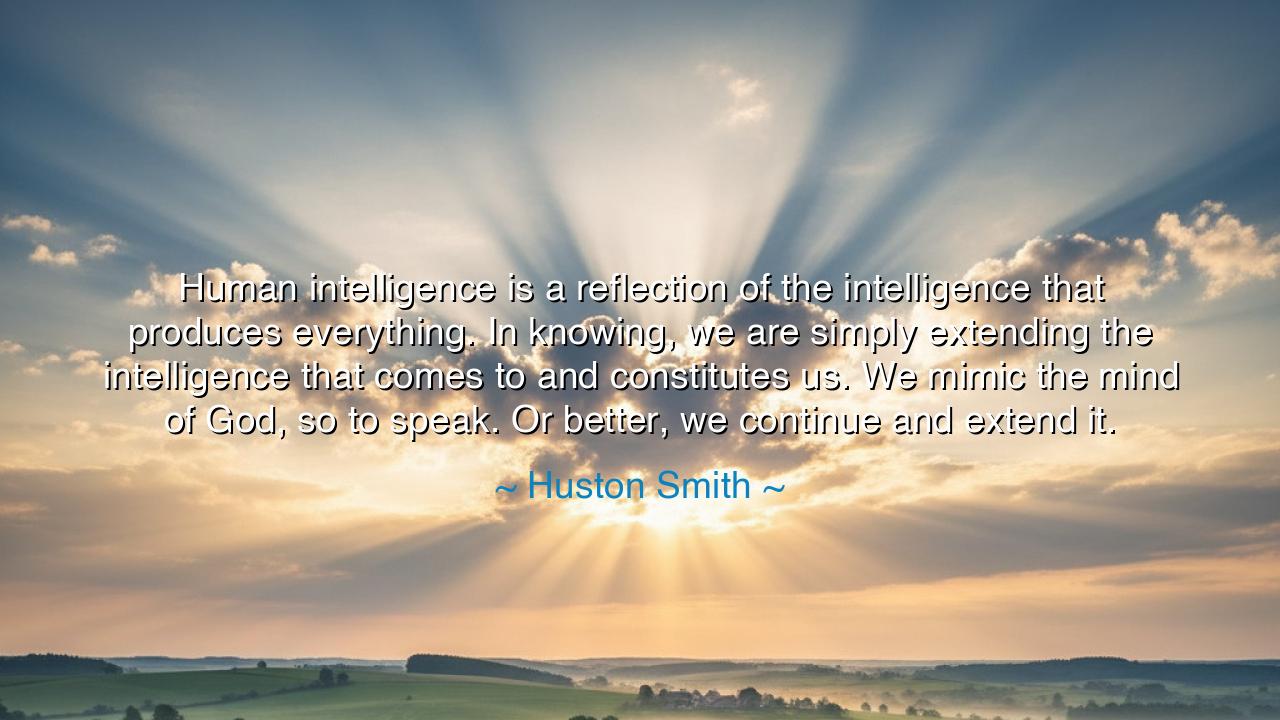
Human intelligence is a reflection of the intelligence that
Human intelligence is a reflection of the intelligence that produces everything. In knowing, we are simply extending the intelligence that comes to and constitutes us. We mimic the mind of God, so to speak. Or better, we continue and extend it.






When Huston Smith proclaimed, “Human intelligence is a reflection of the intelligence that produces everything. In knowing, we are simply extending the intelligence that comes to and constitutes us. We mimic the mind of God, so to speak. Or better, we continue and extend it,” he was not speaking merely of thought, but of cosmic kinship—of the sacred thread that connects the human mind to the divine essence of creation. His words are a hymn to the eternal truth that intelligence is not born from man alone, but flows through him like a river through a vessel. To know, to reason, to imagine—these are not isolated acts of the human brain, but echoes of the Infinite Mind that breathes through the universe.
The origin of this quote lies in Huston Smith’s lifelong devotion to understanding the world’s great spiritual traditions. As one of the most respected scholars of comparative religion, he sought not to divide knowledge into faith and science, but to unite them. His words here are drawn from the mystical insight shared by sages of every age—that the human intellect is not an accidental spark, but a ray of divine intelligence, reflecting the light of the Source from which all consciousness springs. Just as the flame mirrors the fire, our thought mirrors the intelligence of the universe itself. This is the foundation of his message: that in knowing, we do not separate ourselves from the divine—we participate in it.
The ancients, too, recognized this truth in many forms. The philosopher Plato taught that all knowledge is recollection—that the soul, having once dwelt among the eternal forms, recalls fragments of that divine wisdom in life. To know anything truly, said Plato, is to remember the truths that the soul already carries. Likewise, the mystics of the East taught that Atman is Brahman—that the self within is one with the vast intelligence that governs all existence. Huston Smith’s words are a bridge between these traditions, a modern echo of the ancient truth that human understanding is divine remembrance, a continuation of the eternal mind that shaped the stars, the oceans, and the heart.
Consider the story of Isaac Newton, who, after uncovering the laws of motion and gravity, did not see himself as a godless scientist but as a humble observer of divine order. He once said, “I was like a child playing on the seashore, finding a smoother pebble or prettier shell, while the great ocean of truth lay all undiscovered before me.” Newton’s revelation was not just physical—it was spiritual. In the precision of the planets, he saw the fingerprints of divine intelligence, and in his discoveries, he felt himself continuing the work of creation—just as Huston Smith described. To understand nature, Newton believed, was to glimpse the thoughts of God.
To say, as Smith did, that “we mimic the mind of God” is to acknowledge that our ability to think, to create, to love, and to seek meaning is an act of sacred imitation. The painter who captures beauty, the philosopher who seeks truth, the child who wonders at the stars—all are engaged in divine mimicry. But Smith’s correction—“Or better, we continue and extend it”—elevates this even further. We are not mere imitators; we are participants in divine evolution, vessels through which the intelligence of creation expresses itself anew. Every act of discovery, every flash of insight, is not separate from God’s mind—it is God thinking through us, continuing the work of creation through human hands and human hearts.
Yet there is a lesson of humility in this as well. For if our intelligence is a reflection of divine intelligence, then we must wield it with reverence and responsibility. To misuse knowledge—to separate it from compassion and wisdom—is to distort the very source from which it flows. The ancients warned that the pursuit of knowledge without humility leads to ruin; wisdom without love is blindness. True understanding, Smith reminds us, is an act of harmony between the human and the divine. It is not dominance over nature, but communion with it—not the conquering of truth, but its reverent discovery.
Therefore, let this teaching be passed down as an eternal flame: the intelligence that burns within us is not our possession—it is our inheritance. We are caretakers of a divine light, entrusted to nurture it, to share it, and to expand its reach through compassion, curiosity, and creation. Let us remember that in every act of knowing, we are co-creators with the universe, continuing the great story that began before time itself.
So live with wonder. Learn with humility. Create with love. For every thought you think, every truth you uncover, every beauty you bring forth, is not merely yours—it is the mind of God unfolding through you, eternally reaching toward its own reflection in the heart of humankind.






AAdministratorAdministrator
Welcome, honored guests. Please leave a comment, we will respond soon